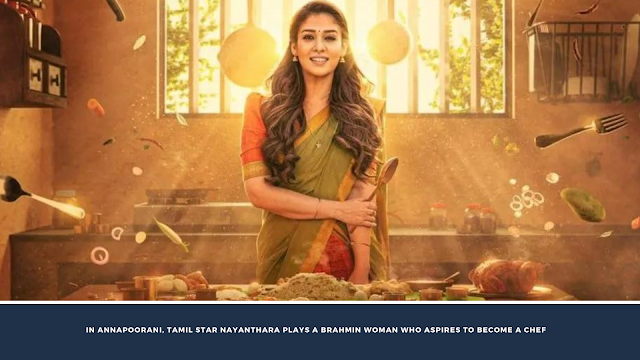The Tamil film 'Annapoorani: The Goddess of Food' has been removed from Netflix and faced backlash for allegedly offending Hindu religious sentiments, just days after its debut on streaming services. In the movie, which stars Nayanthara, a Brahmin woman defies her family's traditions by eating meat, sparking demonstrations and legal action. Concerns concerning religious sensitivities and artistic freedom in India's film industry are brought up by the controversy.
Days after it was made available for streaming, an Indian movie that sparked outrage for allegedly "hurting Hindu religious sentiments" was taken down from Netflix.
The Tamil-language movie Annapoorani: The Goddess of Food was taken down, according to Netflix, at the "licensor's request".
In the film, Nayanthara plays a Brahmin woman from India who wants to be a chef.
She is shown eating meat and learning how to cook it, defying the religious beliefs of her family.
Many Brahmins abstain from meat consumption due to strict caste regulations.
Hard-line Hindu organisations had taken issue with this and other scenes in the film, such as the one where the actress is depicted praying the Muslim prayer known as namaz before preparing biriyani.
A scene in which a Muslim character implies that the Hindu god Ram ate meat also offended some Hindus.
The makers of the movie have yet to provide an official statement on the matter.
In the state of Madhya Pradesh, a police case has also been brought against Nayanthara and two other people connected to the movie.
Hard-line Hindu organizations have accused a number of movies and television programs in recent years of hurting religious feelings. After being accused of making fun of Hindu gods, the cast and crew of the Amazon Prime series Tandav issued an apology in 2021.
Critics gave Annapoorani mixed reviews when it first came out in theaters on December 1. Some hailed it for showing a woman from an orthodox family pursuing her dreams, while others referred to it as "an all-you-can-eat buffet of undercooked subplots."
It was approved by the Central Board of Film Certification in India, also referred to as the censor board, which evaluates films before they are shown in public.
However, the controversy started a few weeks later after it was made available for streaming on Netflix, which launched on December 29.
A Mumbai resident by the name of Ramesh Solanki lodged a police complaint last week, citing various scenes as objectionable; however, the case has not yet been opened there. On X (previously Twitter), Mr. Solanki identifies as a "proud Hindu Indian nationalist".
The hard-line Vishwa Hindu Parishad (VHP) reportedly yelled slogans outside the Netflix office in Mumbai, according to Reuters.
A letter of apology from Zee Entertainment Enterprises, the parent company of Zee Studios, which co-produced Annapoorani, was shared on Thursday by Mr. Solanki and a representative for the VHP.
"We have no intentions as co-producers of the film to hurt the religious sentiments of the Hindus and Brahmins community," the letter stated.
Additionally, it stated that the producers were working with Netflix to remove the movie from its platform "until edited" and would address any concerns about the film.
When the BBC emailed Zee to request comment, Zee did not reply.
Some people expressed happiness that the movie had been removed from Netflix, while others expressed dismay. A "dangerous precedent" would be set, according to actress Parvathy Thiruvothu.
Nikhila Henry provided additional reporting from Delhi.
Source: BBC
The recent removal of "Annapoorani: The Goddess of Food" from Netflix, following allegations of offending Hindu religious sentiments, highlights the delicate equilibrium that filmmakers must maintain between artistic expression and cultural sensitivities. Initially, the film garnered mixed reviews for its portrayal of a Brahmin woman challenging societal norms, but it soon sparked controversy with scenes that certain groups found offensive.
This incident sheds light on the ongoing struggle between creative freedom and the potential to offend religious sentiments, a long-standing issue within India's film industry. Despite receiving approval from the Central Board of Film Certification, the film's release on a streaming platform resulted in protests, legal actions, and calls for censorship.
As discussions surrounding the film persist, it prompts us to reflect on the roles of filmmakers, streaming platforms, and audiences in navigating this intricate landscape. Striving to strike a balance that respects diverse beliefs while fostering creative expression remains a formidable challenge. Moreover, this incident establishes a precedent for future debates on cultural representation and the freedom of artistic endeavors within India's dynamic film industry.



.png)




